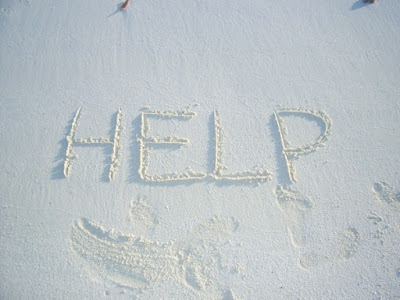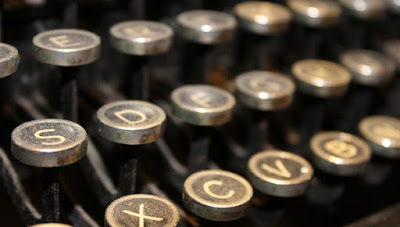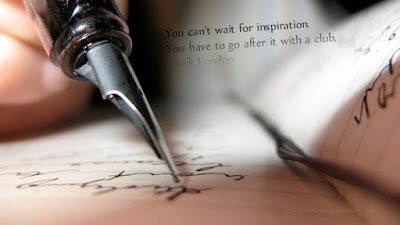After exploring the pagan roots of the midwinter festivals and the
dying Sun God, we travel into the darkness of the far north. This is where
we’ll find the origins of Christmas, its real meaning, and a hint at our true
purpose on this earth.
The Origins of Christmas: Part 1 - Pagan Roots
Christmas is a time to feast and make merry, to gather the
family and exchange gifts, sing wonky carols, and get so drunk you forget your
own name. You decorate an unfortunate tree that’s been dragged inside your
centrally heated home, send greetings cards to people you spend the entire year
avoiding, lie to your children about a fat man dressed in red who climbs down
chimneys, and pursue your colleagues around the office waving mistletoe while
wearing a ridiculous jumper.
How to Write Point of View
Before you begin to write a story there’s one crucial choice to make: who is the narrator? The narrator is the character(s) telling the story, whether that’s the protagonist, multiple characters, or an observer.
The point of view (POV) taken by the narrator is the reader’s way in to the story – it’s how they connect with the characters. Get the POV right and the reader will forget they’re even reading. The characters and the world of the story will come to life and the words on the page become invisible.
The point of view (POV) taken by the narrator is the reader’s way in to the story – it’s how they connect with the characters. Get the POV right and the reader will forget they’re even reading. The characters and the world of the story will come to life and the words on the page become invisible.
How to Write Dialogue
Creating dialogue is one of the most enjoyable and the most challenging parts of writing. Dialogue isn’t like real speech. If you write dialogue to resemble real speech you’ll end up with something unreadable.
How to Write Characters
At the heart of every successful novel are good characters. And by ‘good’ I don’t mean a character who never does anything bad, is kind to small animals and children, and never swears. Well written characters bring a story to life and give the reader someone to care about, root for, or even love to hate.
Characters aren’t like
real people.
How to Write Opening Lines
The hardest part of writing a novel is the opening. As attention spans shrink and a million distractions pull at our minds, it’s harder than ever to get people to sit still long enough to read to the end of the first page, let alone the first paragraph. An average novel is between 80,000 to 100,000 words, so reading a novel will take some time. (Writing one takes even longer!) Many would rather watch the movie version of a story instead – two hours and you’re done.
If you want readers to stick with your novel and read to the end, you must grab their attention right from the start. Opening lines, and the first page, are crucial.
If you want readers to stick with your novel and read to the end, you must grab their attention right from the start. Opening lines, and the first page, are crucial.
How to Write a Synopsis
Writing a synopsis is one of my least favourite activities and I’ll do almost anything to avoid it. But a well written synopsis is essential if you want to sell the book you’ve been working on for months/years.
A synopsis is the sales pitch for your novel and it’s
designed to entice an agent or publisher into reading your complete manuscript.
It’s usually sent out with three sample chapters, but if the reader doesn’t
like your synopsis, they won’t even look at your beautifully crafted chapters.
So it pays to spend some time honing your synopsis, no matter how excruciating
that may be.
Mind Training with the Puppy Technique
You may find this hard to
believe, but your mind is a puppy. Train it well, treat it with respect, and
you’ll have a lifetime of devoted service sitting between your ears. Wet nose
optional.
Let me explain.
Get Carter Gets Demolished
The Get Carter car park is soon to be no more. It’s been a
long time coming, but this week the concrete-eating machines began feasting on
the decrepit monstrosity: the iconic Brutalist monument hunched on the prow of
the hill overlooking the Tyne. About the only thing going for it was its
starring role in Get Carter and its spectacular views of the area.
The Flammarion Engraving: Escaping the Crystal Sphere
This is the well-known
wood engraving by an unknown artist. It's often attributed to Camille Flammarion because it first
appeared in his book The Atmosphere:
Popular Meteorology in 1888, but he probably just commissioned it. The
engraving depicts a medieval pilgrim carrying a staff pushing his head through
the border between worlds to look at the inner workings of the universe.
The Creative Process: Sharing your Masterpiece
If the creative process has gone well, you should now be ready to share your work in the final stage: SHOWING. The moment of truth!
The Creative Process: Finishing your Masterpiece
The fifth stage of the creative process is COMPLETING. During the hard work of the previous stage, one question keeps coming up: when is my book finished?
The Creative Process: The Trance of Writing
The fourth stage of the creative process is WORKING – the hard slog of getting the writing done. You’ve got your story and done the research, shaped your character arcs and structured the plot. Now you write.
The Creative Process: Starting to Write
 |
| Throes of Creation |
We’ve reached the hard part of the creative process: STARTING. This is the moment of commitment. You’ve made your choice, you have an idea – now you must start writing. This is when the demons come out to play and procrastination takes over your life. Suddenly there’s a million other things you need to do and the writing fades into the background. You need to find a way to navigate the moment of starting otherwise your inspirations will shrivel and limp away, never to return.
The Creative Process: Choosing the Right Idea
The Creative Process: Nurturing your Creativity
WISHING is the first stage of the creative process and is about nurturing your desire to create something. This is where you look for ideas and inspiration, and research stories to obsess over.
A Writer’s Guide to the Creative Process
 |
| The Weight of Words |
Writing a book is a transformative experience – terrifying and thrilling at the same time – like exploring a jungle or climbing a mountain. The process can take many twists and turns and you never know where you’ll end up. With that in mind, this series will explore the creative process and map out some of the territory. I’ll give you a detailed guide you can apply to your own creative process that will help you to start and then, even more importantly, finish your book.
Characteristics of a Writer
Sometimes it seems everybody wants to be a writer. Mention
to your friends that you’re writing a book and you’ll be greeted by a chorus
of: oh, I wish I could do that, if only I had the time, I’ve got loads of great
ideas. Either that or they want to know if you’re writing about them. As if you would...
So what does it take to be a writer?
So what does it take to be a writer?
Why Writers Are Crazy
After busting a few writing myths it got me thinking
about why writers are often seen as crazy – by others and themselves. Is there
something about writing that leads people to become unhinged? Or do you have to
be crazy to be a writer in the first place?
Myths About Writing
People have strange ideas about writing. Some of those
people are writers.
You can understand non-writers being baffled by the whole
writing thing: the alchemy of transforming words into a world that transports
the reader. From the outside it seems like magic. You open a book and begin to
read: the ordinary world fades and into your mind springs another, complete
with characters who seem so real you half expect to run into them in Tesco
buying cornflakes or bratwurst or the latest copy of Cosmo.
This magical thinking can infect writers too, especially
when they first start out. Writers can suffer from impossibly high
expectations, or perhaps delusional fantasies, of what writing is really about.
Books for Writers
A selection of recommended books on Writing. These are some of the books I’ve found particularly helpful over the years.
40 Rules for Writers
There are loads of rules for writers, ranging from profound
wisdom to statements of the obvious. I’ve gathered together some of my
favourites here, plus a few inspiring quotes. When I start to doubt myself or
just need a confidence boost, I turn to advice like this to get me moving
again. I hope it helps you do the same…
Why Do Writers Write?
This had never happened before. I stared at the barely legible scrawl and wondered if I was possessed. The story was about a woman trying to find her way out of a confusing situation. No surprise there. But then I realised it was based on the Buddhist idea of the realms of samsara. I had been reading The Tibetan Book of Living and Dying by Sogyal Rinpoche and it must have taken root. In an attempt to process and understand this complex Buddhist cosmology, my unconscious had created a waking dream. And I walked right into it.
Subscribe to:
Comments (Atom)


























